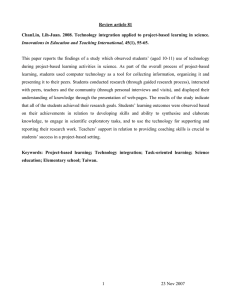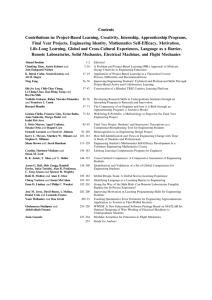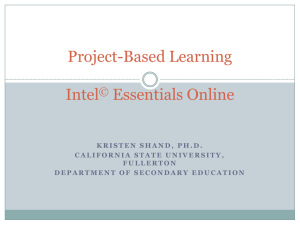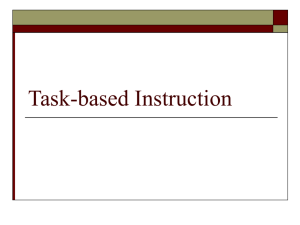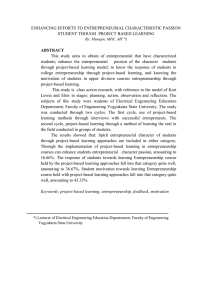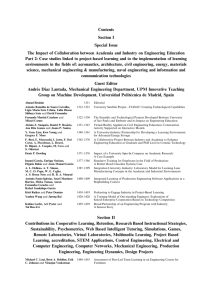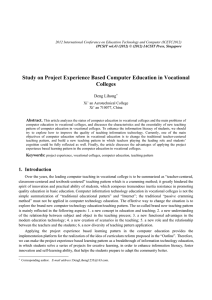Project Management Fundamentals Project Organization and
advertisement
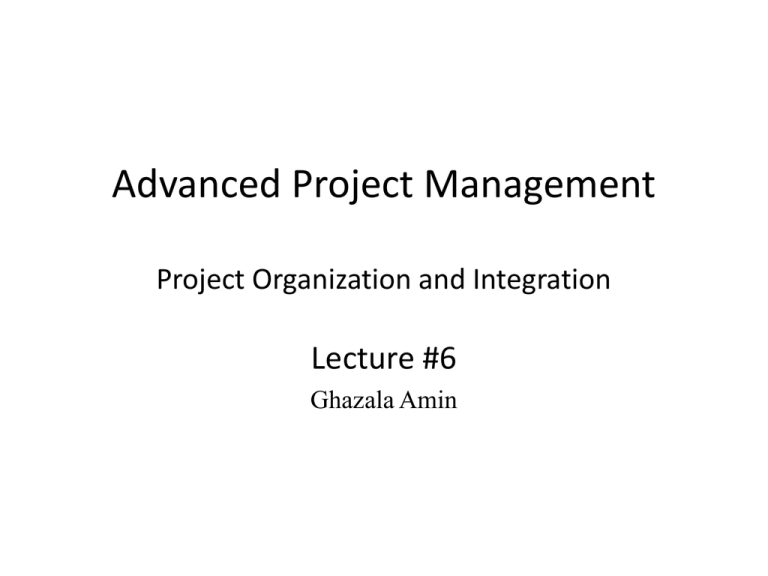
Advanced Project Management Project Organization and Integration Lecture #6 Ghazala Amin PM Framework and Integration Project Life Cycle Team Development Managing Project Human Resources Activities Processes Project Initiation Planning Project Organizing WBS Executing/Control Project Monitoring Control Project Meetings Scheduling Closeout Project Closeout Change and Risk Management Contract and Customer Relationship Management Project Parameter: Goal All projects have one prime goal – for e.g., the development of a new camera, construction of a railway station, regeneration of a derelict neighbourhood, or process re-engineering for a large organization. •The goal must be as specific as possible so that there is no ambiguity about what the project intends to achieve. •In addition to the prime goal, projects may have subgoals and subsidiary goals (objectives). •The project goal and project deliverables along with all the requirements and specifications, which must be met by the project for it to be considered complete, determine the project‘s scope. •A project which does not achieve its goal is seen as failed. Project Parameters: Important Topics Project Proposal Project Contract Project Charter Elicitation of Project Requirements and Specifications Project Statement of Work Project Scope Statement Project Work Breakdown Structure Scope Creep, Control and Verification Project Change Management Project Integration Management Project Output & Outcome: Highway:Example Project Life-Cycle Project Phase Initiation, Planning, Implementation and Closure of the Project Operations Phase Short-term Medium-term Not Projects: Routine maintenance & repair Selected Project Outcomes (+ and -) Long-term Projects: Highway extension, widening, recarpeting, con-struction of bridges, additional exit and entrance ramps, petrol stations and rest stops etc. Project Output Economic – Impact on investment, trade, local businesses, tourism, employment, inflation, wealth accumulation and distribution Social – Impact on services like health and education, travel, crime, social relations, communities‘ outlook and values Environmental – Impact on fauna and flora, pollution levels, waste accumulation and disposal Major Projects in Pakistan (Examples) Tarbela Dam Mangla Dam Ghazi-Barotha HUBCO Kot Addu Chashma Nuclear Power Station Islamabad-Lahore Motorway Islamabad-Peshawar Motorway Karakorum Highway Jinnah International Airport Allama Iqbal International Airport Muslim Commercial Bank National Stadium Karachi Shah Faisal Mosque Shaukat Khanum Memorial Hospital JF-17 Sino-Pakistan Combat Aircraft What Projects Are Not Projects must not be confused with an organization‘s on-going and recurring operations. For example: - Customer invoicing and billing - Fabrication or assembly of automobiles - Airline flights - Advising a bank client of stock market investment opportunities - Treatment of patients in a hospital emergency ward, and - Counselling of soldiers on a tour of wartime duty are not projects even though they may exhibit project characteristics (goal, time-frame, cost). Project Organization Structure • Project Based Organization • Organizations that drive their revenue primarily from performing projects – Construction contractors, consultants, engineering firms etc. • Organization that have adopted management by projects – Have management systems and PMO with financial, reporting and performance tracking process in place. • Non Project Organization • Often lack Mgmt system designed to support project needs effectively and efficiently – Manufacturing companies, financial service providers etc. Project Organization Structure » Functional – An organization structure in which staff are grouped hierarchically by function and may be assigned to projects in a team. » Matrixed – Project Manager shares responsibility with functional manager to assign priorities and direct work of assigned human resources ; – a blend of functional and projectized organization. (PMBOK) » Projectized – Project manager maintains complete authority over the entire project resources. Manages and leads the team till project closure. The Functional Form of Organization In the functional form of organization, work activities are structurally segmented according to their “function’ – i.e. their similarity of purpose. For example: - Accounting & Finance - Production - Research & Development - Marketing - IT Support - Procurement - General Administration These are the typical functions one would expect to find in most commercial organizations. Project managers in functional organization must ensure that team understands that conflicting orders will be given by other managers Project Coordination in Functional Organizations Corporation X Project Coordination Human Resources Marketing Electronics Engineering Customer Service Finance & Administration Engineering Software Engineering Domestic Sales Manufacturing Mechanical Engineering International Sales Design Fabrication Assembly Procurement Purchasing Receiving & Inspection Testing Production Scheduling What is the Project Matrix Organization? The Matrix organization is a form of project organization within the framework of which temporary horizontal (project) levels are applied over the permanent vertical (functional) levels of the organization. Project Management defines three basic project matrix forms: the Functional Matrix, Balanced Matrix, and Project Matrix. In practice, the matrix structure can assume many different manifestations and these may change over the course of the project life-cycle. A weak matrix organization complicates team development process and activities The Balanced Project Matrix Functional Manager Functional Manager Functional Manager Staff Staff Staff Staff Staff Staff PM Staff Staff Staff Staff Staff Project Coordination About the Project-Based Organization In a project-based organization, most of the work performed is project work and this is reflected in the organization‘s structure which is not based on the functional paradigm but changes acccording to the projects which the organization has in its portfolio. Project-based organizations are often found in the defence and construction industries, in the movie industry, in some NGOs and in some outsourced industries. A strong or project matrix organization is best for handling cross-functional project needs for a large complex project. Structure of a Project-Based Organization Corporation X Marketing Other Projects Finance and Administration Manufacturing Other Projects Legal Project Manager (Project B) Project Manager (Project A) Engineering Human Resources Procurement Engineering Subcontractors (X, Y, Z) Manufacturing Procurement
